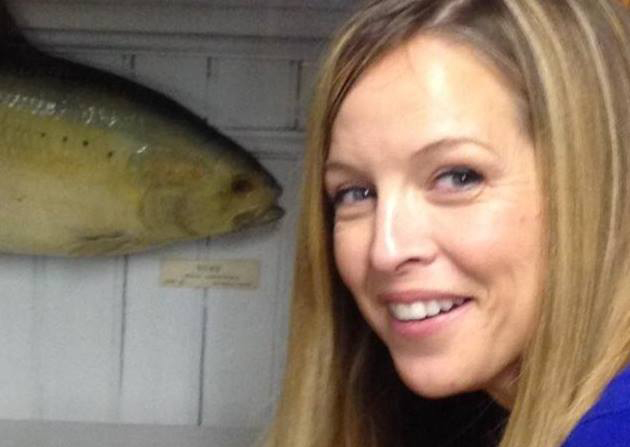ASU Professor Works to Empower Citizen Scientists
March 3, 2015

This article first appeared in ASU News
As a teenager, Darlene Cavalier didn't care much about science.
“I had other priorities,” said Cavalier, a professor of practice with Arizona State University’s Center for Engagement and Training in Science and Society. “I was waiting for the clock to hit 2:36 p.m., so I could run off to dance and cheer.”
In college she majored in communications with a minor in dance, and by her senior year Cavalier was cheering professionally for the Philadelphia 76ers.
As fate would have it, her first job out of college was a temporary position in a company contracted by Discover to do administrative work for the Discover Magazine Awards for Technological Innovation. Part of her responsibilities required reading the applications and speaking with the scientists who were potential candidates for the award.
To her surprise, she thoroughly enjoyed the conversations.
“That was my first recollection of ‘getting it,’ of understanding the science,” she said. “And science felt like it was for me.”
She eventually worked her way up to executive director of the awards program and senior manager of global business development at Walt Disney Publishing after they purchased Discover.
But along with her new love of science grew a new frustration.
“If you don’t have a science degree, and you’re not going to go into teaching or policymaking, you’re relegated to passive consumer of this wonderful information," she said. "That’s frustrating for someone who wants to do something, to be a part of it. I felt like I had missed the boat.”
Cavalier, who wondered how many others there were, who, like herself, became turned on to science later in life, decided to go to graduate school to figure out how to expand science research opportunities for everyday citizens.
Now, as part of the ASU faculty, she has been elected to the inaugural board of the Citizen Science Association (CSA), an organization recently established to improve opportunities for everyday people to get involved in science.
A 'citizen scientist' advocate
Her graduate studies led her to the intersection of scientific research and civic engagement – where she discovered that a lot of people without science degrees – “citizen scientists” – were already monitoring their environments or collecting data for researchers.
To make it easier for scientists to post their research projects and citizens to sign up to help, Cavalier founded SciStarter, a searchable database of community science projects. SciStarter now has nearly 1,000 projects and tens of thousands of citizens participating.
Additionally, she started science cheerleader, an organization that now has nearly 300 professional cheerleaders pursuing careers in STEM (science, technology, engineering and math). The cheerleaders organize events around the country encouraging young girls to consider STEM careers, and adults to get involved with citizen science projects.
Now, in her new role on the CSA board, Cavalier hopes to raise awareness of citizen science and its potential to empower the public, benefit research and inform public policy.
“Darlene is a real champion for citizen science, and she knows how to work with other organizations to see where pieces fit as part of a whole to really build out the field,” said Jennifer Shirk, communications coordinator for CSA and manager of professional development for public engagement at Cornell Lab of Ornithology, where she’s worked to compile best practices for citizen science. “Darlene’s also really astute at understanding how to set up and run an organization that is responsive to the needs of the people it’s serving.”
CSA’s first annual conference, held in conjunction with the American Association for the Advancement of Science’s (AAAS) annual meeting earlier this month, drew nearly 700 people from 25 different countries.
“They represented all scientific disciplines and different kinds of citizen science projects, as well as science researchers, educators, evaluators, data managers and technologists,” said Shirk.
Citizen science is one of CENTSS’s core programs, where Cavalier recently joined the faculty.
“There’s been meteoric growth of citizen interest in science, scientist awareness of how their research can benefit from the inclusion of citizens, and studies of this relationship,” said Ira Bennett, co-director of ASU CENTSS and assistant director of education at the Center for Nanotechnology in Society at ASU. “While ASU has been steadily involved in citizen science, Darlene will enable ASU to tap into a much larger citizen science arena.”
In addition to expanding opportunities for citizens to provide policy input, Cavalier’s current work is aimed at providing more opportunities for citizen scientists to draw upon conclusions, ask more questions, form their own research questions and connect with others who have similar questions.
“Rather than scientists posting projects and saying, 'Here’s how you can help,' it’ll be more about featuring people who have the data and having researchers come to them,” said Cavalier. “Ultimately, that’s one way to empower people.”
Jennifer Pillen Banks, Jennifer.P.Banks@asu.edu
480-965-8602
The Center for Nanotechnology in Society
Want more like this? Get our newsletter.
Learn about upcoming events, publications and other CNS-ASU activities every month.
About
Tags
citizen science CNS engineering JRI nano and society nanodays nise net NSf outreach phoenix photovoltaic policy precipitation public engagement publishing research responsible innovation rtta 2 rtta 3 rtta 4 scenarios science science cafe science policy societal socio-technical integration solar solar power space STEM stir STS sustainability synthetic biology tempe festival of the arts the Design School trc 2 urban planning viri winter school



Add new comment